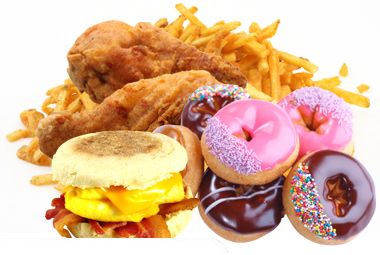Dopamine
Food and the Brain's Reward System
How high-fat diets change the brain's "tastes" for food.
Posted August 15, 2013

On a recent episode of Extreme Weight Loss, the star was a young woman who was addicted to high-fat junk foods. To motivate her to change her diet, trainer Chris Powell volunteered to eat what the woman typically ate in a single a day. Powell started with fast-food breakfast sandwiches and double hash-browns, followed midmorning by two large doughnuts. At lunch time, he started in on his twenty chicken nuggets—and became physically ill. He vomited the food and could not continue. Why did his body reject the food that his mentee's body was willing, even eager, to accept. The trigger for vomiting comes from the brain. What conditions one brain to a high-fat regimen while another cannot tolerate too much high-fat food?

Part of the answer to that question has come from some recent research published this week in Science. A team of researchers affiliated with the John B. Pierce Laboratory in New Haven, CT; Yale University School of Medicine in New Haven, CT; Yeshiva University in Bronx, NY; and Tongji University in Shanghai, China used mice to investigate how the gut and the brain converse about high-fat food. They wanted to find out why eating too many fatty foods can weaken the brain’s “reward” circuit, leading a mouse (or a person!) to compensate by eating even more of same.
Says Yale researcher Ivan E. de Araujo, "We have been interested in how the gastrointestinal tract sends signals to the brain's reward circuits. We knew from previous research that the presence of calories in the gastrointestinal tract was sufficient to trigger release of dopamine, the major chemical transmitter acting on the reward circuitry. We found that high-fat fed animals lacked such a response, which led them to overconsume calories as a compensatory response. We then aimed at determining the physiological basis for such deficiency."
De Araujo, Luis Tellez, and their colleagues have discovered that a particular lipid messenger in the gut, known as oleoylethanolamine (OEA), controls the brain’s perception of reward value when it comes to food. The researchers studied two groups of mice—one fed a high-fat diet and another fed a low-fat diet. They found that the high-fat group had unusually low levels of OEA in their intestines. Additionally, in response to fat, the brains of mice on high-fat diets didn’t release as much dopamine, the neurotransmitter associated with reward, compared to mice on low-fat diets. Thus high-fat diets can disrupt communication between the gut and the brain.
An infusion of OEA into the mice that were fed high-fat diets seemed to restore the rodents’ dopamine-based reward response. It even led the mice to choose more low-fat foods when given the option. Based on these findings, the researchers suggest that OEA signaling in the gut may help limit the consumption of high-fat foods through its effects on the dopamine-based reward circuit in the brain. "It shows that the brain's reward circuitry is highly sensitive to the energy content of foods, independent of sensory properties such as flavor. It means that calorie sensing in the gastrointestinal tract is an important activator of this brain's reward circuitry, and thus alterations in gastrointestinal physiology—such as those induced by excess dietary fat—may be responsible for abnormal feeding behaviors in the obese," says de Araujo.
The research shows that the ability of animals to find a low-calorie meal attractive depends on an efficient communication system involving the small intestine and the brain's reward circuitry. "We show that gastrointestinal signals, rather than just acting to reduce appetite, actually function to influence the rewarding properties of foods. We thus propose that satiety signals acting through the vagus nerve actually function as rewards," says de Araujo.

Whether this concept can be developed into a useful weight-loss strategy, however, remains to be seen. Says de Araujo, "We aim at testing in humans if a similar approach would help to reverse some of the abnormal brain patterns observed in obese individuals, as well as ameliorate behavioral alterations in humans that are linked to these abnormal brain responses."
For More Information:
"A Gut Lipid Messenger Links Excess Dietary Fat to Dopamine Deficiency," by L.A. Tellez; S. Medina; W. Han; J.G. Ferreira; X. Ren; I.E. de Araujo; L.A. Tellez; W. Han; J.G. Ferreira; P. Licona-Limón; X. Ren; I.E. de Araujo; W. Han; T.T. Lam; G.J. Schwartz. Science, August 16, 2013.


